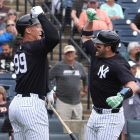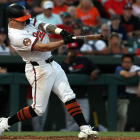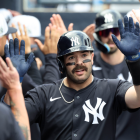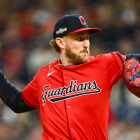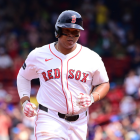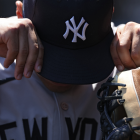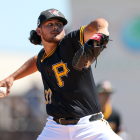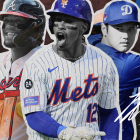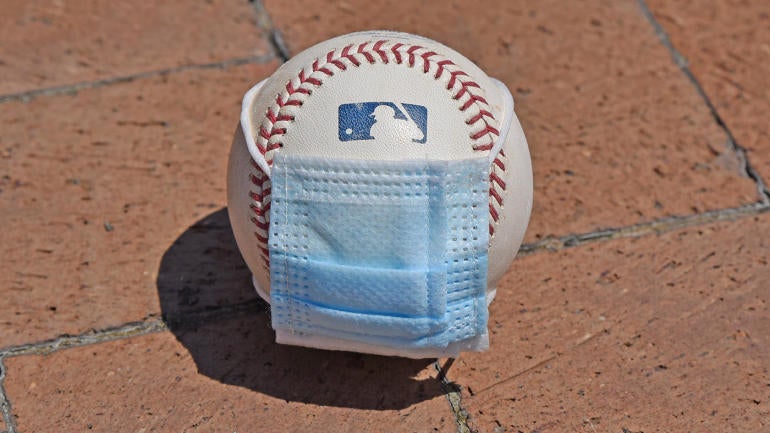
The ongoing novel coronavirus pandemic has roiled every layer of society and will continue to do so for the foreseeable future. Major League Baseball has been no exception. What follows is a timeline of how the outbreak has affected MLB, which not so long ago was providing us with the comfortable routines and assumptions of spring training. Now, the only thing certain about the 2020 season is the uncertainty surrounding it.
This is how we got to that uncertain and uneasy place in baseball.
Dec. 31, 2019: The China offices of the World Health Organization (WHO) are informed of a cluster of pneumonia cases in Wuhan City of unknown origin.
Jan. 7, 2020: Chinese authorities isolate and identify a new type of coronavirus, which will come to be known as COVID-19.
Coronaviruses are a large group of viruses that can cause illnesses as minor as the common cold, or as serious as Middle East Respiratory Syndrome (MERS) and Severe Acute Respiratory Syndrome (SARS), according to WHO. The COVID-19 virus can cause symptoms including fever, cough, and shortness of breath, according to the U.S. Centers for Disease Control and Prevention. While some patients show mild symptoms and recover, others develop life-threatening complications, such as pneumonia.
Jan. 13, 2020: Thailand reports the first known and lab-tested case of imported COVID-19.
Jan. 20, 2020: The first U.S. case of COVID-19 is reported in Washington state.
Feb. 10, 2020: Pitchers and catchers begin reporting to spring training in Arizona and Florida.
Feb. 14, 2020: Position players begin reporting to spring training.
Feb. 22, 2020: Cactus and Grapefruit League spring training games begin.
Feb. 28, 2020: WHO elevates the global threat level for COVID-19 from "high" to "very high," which puts it in the same category as the existing threat level for mainland China.
March 3, 2020: WHO confirms the first U.S. death from COVID-19.
March 4, 2020: WHO confirms the 100th U.S. case of COVID-19.
March 9, 2020: Following a conference call with all 30 teams, MLB announces its intent to continue playing spring training games and to open the regular season on March 26 as planned. The statement notes that MLB has been in regular contact with health officials. MLB does, however, limit clubhouse access to players and essential personnel. Most notably, this means media are no longer allowed in spring training clubhouses.
March 10, 2020: The Mariners are looking into the possibility of playing regular season games at their spring training facilities in Arizona, Evan Drellich of The Athletic reports.
March 11, 2020: Washington governor Jay Inslee, whose state has been hit the earliest and the hardest by COVID-19, announces a ban on large group gatherings through at least the end of March. Soon after, the Mariners announce that they "are working with the Major League Baseball office of the commissioner on alternative plans for our games that were scheduled for the end of March at T-Mobile Park in Seattle."
The City and County of San Francisco also announce a two-week ban on gatherings of more than 1,000 people. The Giants soon after announce that their scheduled March 24 exhibition against the Athletics in Oracle Park in San Francisco has been cancelled.
The City of Oakland and Alameda County likewise announce a prohibition on public gatherings of 1,000 people or more people through the end of March. The A's announce they are working with MLB to reschedule the affected games.
MLB is exploring the option of having teams from the most affected locations play games at alternative sites as opposed to playing in empty home ballparks, Jared Diamond of the Wall Street Journal reports.
The NBA suspends its season indefinitely after Utah Jazz center Rudy Gobert tests positive for the virus. The preliminary positive test result is learned moments before the Jazz tip-off against the Oklahoma City Thunder. The news and the NBA's swift response to it will lead to the shuttering of other major sports leagues and events.
WHO declares the COVID-19 outbreak to be a global pandemic.
March 12, 2020: MLB announces that spring training games are cancelled as of 4 p.m. ET and that the start of the regular season has been pushed back two weeks. Opening Day had originally been scheduled for March 26. MLB's decision comes after the NBA, NHL, and MLS all suspended their seasons, which were already in progress.
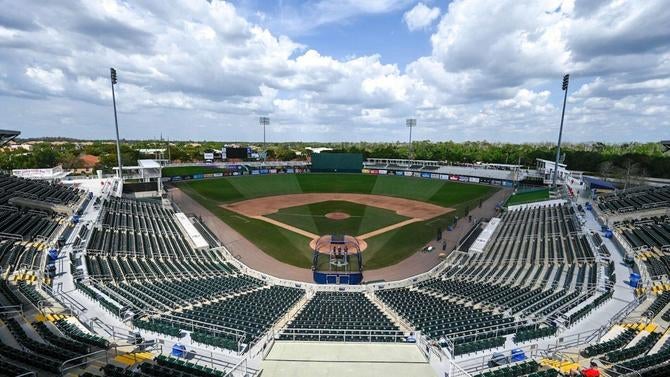
The NCAA cancels the all spring and winter championships. Most notably, that means neither the men's nor women's NCAA Basketball Tournament will be held in 2020. It also means that the College World Series in Omaha, Nebraska, has been cancelled even though the event isn't until early June -- almost three months away. For the first time, the MLB Draft had been scheduled to be held in Omaha during the College World Series.
March 13, 2020: MLB announces that spring training camps have been suspended. Major league players have the option to return home, remain near camp in Arizona or Florida, or return to their team's home city. The Yankees vote unanimously to remain in camp.
The Mets announce that director of player relations and community outreach Donovan Mitchell Sr. has tested negative for the coronavirus. Mitchell is the father of NBA star Donovan Mitchell of the Utah Jazz, who had previously tested positive.
WHO confirms the 1,000th U.S. case of COVID-19.
March 15, 2020: The Yankees confirm that a minor leaguer in their system has tested positive for coronavirus. The unnamed player becomes the first MLB-affiliated player to be a confirmed COVID-19 case. The team quarantines all minor leaguers for two weeks.
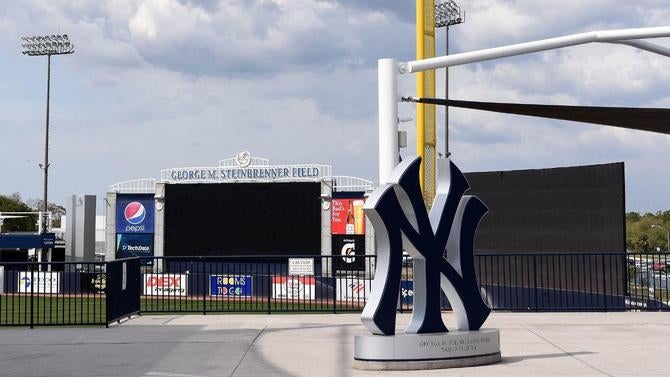
In an internal memo, MLB advises non-roster players -- i.e., those not on a team's 40-man roster -- to return home. MLB also advises teams against holding group workouts. As for players on the 40-man roster, the memo states that "pursuant to our understanding with the Players Association, 40-man roster players must be permitted to remain at the club's spring training site, and are eligible to receive their usual spring training allowances. (Those players currently on optional assignment should receive allowances in accordance with the past practice of the club.) We understand that many 40-man roster players have chosen to remain in camp to date, but we anticipate that may change in the coming days as events continue to unfold and players become better educated about current conditions."
March 16, 2020: MLB announces that the start of the 2020 regular season will be pushed back until at least the middle of May. Commissioner Rob Manfred says team owners still hope to play a full regular season schedule, per Derrick Goold of the St. Louis Post-Dispatch. Also on this day, Tom Haudricourt of the Milwaukee Journal-Sentinel tweets that he's hearing that an early July start date for the regular season is a best-case scenario. Yankees manager Aaron Boone during an appearance on MLB Network Radio says games will be added to the end of the existing regular season calendar.
MLB and MLBPA announce a joint $1 million donation to be split evenly between the Feeding America and Meals on Wheels America organizations.
March 17, 2020: The Yankees confirm that a second minor leaguer in their system has tested positive for the virus. The team states the player has been quarantined and is seeing his symptoms lessen in severity.
Each of MLB's 30 teams commits $1 million to aid ballpark workers during the delay.
March 18, 2020: The Reds announce that an employee based in Arizona has tested positive for COVID-19 and that all team employees who came in contact with that person are self-quarantining and being tested.
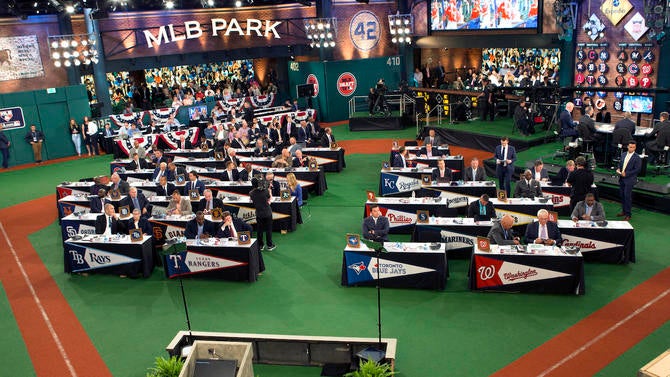
As well, MLB is considering skipping the 2020 draft and international signing period as cost-saving measures, according to the Associated Press. The AP also notes that players and owners are discussing the issue of service time for 2020. Normally, 172 days on an MLB roster are required for a player to earn a full year of service time, which affects things like arbitration eligibility and free agency. If the 2020 season is heavily abbreviated, which seems highly likely, then MLB and the union must hammer out what will constitute the service time cutoff. This has the makings of contentious negotiations.
March 19: MLB cancels the Mexico City and San Juan, Puerto Rico series scheduled for April. MLB also announces that players under uniform minor-league contracts will be paid their standard spring meal allowances in a lump sum. The payments will cover scheduled allowances through the original April 8 start date of the minor-league season. Prior to this initiative, a number of individual clubs announced plans to pay minor-league players their per diems.
With regard to the service-time issue, the MLBPA wants players credited with a full year in 2020 if they earned at least 60 days of service in 2019 no matter how many games are played this year, Joel Sherman of the New York Post and Ken Rosenthal of The Athletic report. MLB in turn is willing to give players credit for a full season if they reach 130 games in 2020 rather than the usual 172 days but would want to prorate if the 2020 season spans fewer than 130 games.
On this same day, the number of worldwide COVID-19 fatalities surpasses 10,000. The number of known cases in the U.S. surpasses 16,000.
March 24: The Red Sox announce that an unnamed prospect within their system has tested positive for COVID-19. The team's spring training facilities are shut down and cleaned, and all personnel to come into contact with the player are self-quarantined. The team says it's likely the player contracted the virus after he left Red Sox camp.
March 25: Commissioner Rob Manfred makes his first public comments since the league shutdown in an interview with ESPN. On what was supposed to be the eve of the 2020 campaign, Manfred says that "nothing is off the table" in regards to the season and he is hopeful teams could return to spring training in May.
March 26: The 2020 MLB Draft, originally scheduled for June during the College World Series, will be pushed back to July and will consist of five to 10 rounds rather than the usual 40, according to ESPN's Kiley McDaniel. As well, McDaniel reports that bonuses for drafted players will be deferred and bonuses for non-drafted players will be capped.
March 27: MLB is still hoping to play a 140-game season with playoffs expanded to 14 teams, Jon Heyman reports. As well, the league hopes to start the season in late May. Although MLB hopes to avoid playing games in empty ballparks and at alternative locations, it's open to doing that if necessary.
MLB and the MLBPA also finalize a deal that establishes a potential framework for the 2020 season. Players will receive service pro-rated service time for 2020, and if no season is played then they'll be credited with the amount of service time they logged in 2019. As for a potential 2020 season, players and owners are willing to stretch the postseason well into November in order to maximize the number of games.
While both sides hope to play games only when mass gatherings are allowed and after medical professionals say it's safe to conduct games, players and owners reportedly are also willing to play games without fans in attendance and at alternative sites such as spring training facilities. As well, in order to accommodate a more compressed game schedule, rosters may be expanded, and the All-Star Game could be cancelled.
March 31: MLB announces extended financial support for minor league players. Those players will continue receiving weekly payments of $400 each through the end of May or until the start of the minor league season, whichever comes first.
Dr. James Andrews announces he'll stop performing Tommy John surgeries at his Florida clinic during the shutdown, in keeping with the governor's orders to cease elective surgeries.
Joel Sherman of the New York Post reports that starting the 2020 season without fans in attendance is becoming an increasing possibility.
The AP reports on the specifics of MLB's payments to players during the shutdown.
- Veteran major leaguers will receive $4,775 per day, for a total of $286,500 over the 60-day span in question.
- As for those lower on the MLB rung, Blum writes: "Less veteran players receive smaller amounts specified in the agreement: $16,500, $30,000 or $60,000, depending on the contract."
- Players not yet eligible for arbitration -- i.e., those with less than three years of major-league service time, in most instances -- will receive those lower payments. Broadly speaking, minor leaguers with some MLB experience will receive $500 a day, while players who have exhausted rookie status while still not being eligible for arbitration will receive $1,000 per day.
April 1: MLB announced the 2020 London Series between the NL Central rival Cardinals and Cubs, originally scheduled for June 13-14, has been canceled due to the pandemic.
The fiance of Webster Garrison, a former major-league player and current minor-league manager with the Athletics, tells the AP that Garrison is hospitalized and on a ventilator because of COVID-19. She also says Garrison is "turning the corner."
April 7: MLB and the MLBPA reportedly discuss a plan to play all games -- or at least all games to start the season until stay-at-home orders are lifted -- in the Phoenix area, primarily at spring training sites and at Chase Field, home of the Diamondbacks. One possible timeline has regular season games starting as early as May. The plan, though, has many logistical hurdles, and MLB eventually says it's just one of many options being discussed.
April 10: MLB reportedly considers using spring training facilities in Arizona and Florida for regular season games. Doing so would require teams to be placed in leagues according to spring training locations rather than the traditional American and National League alignments.
April 13: ESPN's Jeff Passan reports that the "Arizona plan," in which all teams would begin the regular season by playing their games in the Phoenix area, is the most likely path toward beginning the 2020 season.
April 20: CBS Sports' own R.J. Anderson reports that MLB is considering beginning the regular season with three "pools" of teams in three different locations in Arizona, Florida, and Texas.
May 8: MLB and the MLBPA reportedly agree to reduce the 2020 draft from the usual 40 rounds down to five rounds with signing bonuses for non-drafted players limited to $20,000. The plan would save MLB no more than $30 million in total.
May 9: MLB reportedly narrows its focus to beginning the season in early July at as many standard home ballparks as possible. The aim would be a regular season of around 80 games followed by an expanded postseason. Schedules would be organized regionally so as to minimize travel and allow players to isolate with their families in their home cities.
May 10: MLB reportedly receives results from an antibody testing study it agreed to participate in. Of the more than 5,000 MLB employees who were tested for COVID-19 antibodies, just 0.7 percent tested positive. Of those positive tests, 70 percent showed no symptoms.
May 11: The 2021 World Baseball Classic is canceled. The tournament was set to expand to a record 20 teams and be held in three countries (Japan, Taiwan, United States) from March 9-23 next year. The WBC is a collectively bargained event that requires approval from MLB and the MLBPA, and the WBC reportedly may not return until 2023.
May 13: MLB submits protocols for player testing and safety to the union in a 67-page document.
Included in the league's proposed safety protocol: baseball personnel getting tested for coronavirus multiple times a week, with results available within about 24 hours and not requiring the quarantining players or automatically suspending play if a player tests positive. Temperature checks and symptom analysis would take place every day and lockers would follow social distancing guidelines.
MLB reportedly believes that it will be able to gain access to the tens of thousands of testing kits required for this plan without taking tests away from the frontline workers or hospitals.
May 18: MLB's safety proposal for a possible 2020 season also includes 'severe discipline' for fighting. Players who initiate and participate in brawls are already subject to ejection by the umpire and then perhaps fines and suspensions from the league, but this implies that those penalties will be stepped up in severity.
May 20: The Miami Marlins and Tampa Bay Rays are among the first MLB teams to reopen their facilities for limited individual workouts.
May 21: The Players Association respond to the league's coronavirus safety proposal for a possible 2020 season. The union's counter-proposal included notes on testing frequency, protections for high-risk players and their families, and sanitization protocols. Players were also hoping for alterations that would enable them to shower at stadiums and to access hydrotherapy and other preparation and recovery tools that the league's proposal had prohibited due to the risk of infection.
May 24: The Yankees and Mets get the green light to hold spring training from their home stadiums from New York governor.
June 4: MLB informs announcers (both TV and radio) that they will not travel this season, and will instead broadcast road games remotely.
June 4: MLB could allow fans at Astros, Rangers games in 2020 due to policy from Texas governor. The league is reportedly inclined to follow local guidelines for attendance during the COVID-19 pandemic.
Texas governor Greg Abbott said the state intends to permit sports stadiums (and other businesses) to operate at 50 percent capacity, up from 25 percent capacity.
June 5: The Oakland Athletics reverse their original decision of halting minor league stipends amid the coronavirus shutdown. The club was originally planning to stop sending minor leaguers their $400 weekly stipend after May 31. But, Oakland A's owner John Fisher told Susan Slusser of the San Francisco Chronicle that the club now plans to pay minor leaguers their weekly stipend through the end of the scheduled minor league season.
June 10-11: The 2020 MLB Draft takes place remotely via video conference and is televised live. The Detroit Tigers selected Arizona State slugger Spencer Torkelson with the No. 1 overall pick.
MLB had previously reached an agreement with the Players Association to cut the 2020 Major League Baseball amateur draft to five rounds.
June 15: Several Major League Baseball players and team staff members test positive for COVID-19.
June 16: The Texas Rangers become first known MLB team to have front-office employees back to work despite Texas' COVID-19 spike.
June 19: The Philadelphia Phillies close down their Clearwater, Fla. spring training facility after eight positive coronavirus tests. Five Phillies players and three team employees tested positive.
Soon after, the Toronto Blue Jays shut down their Dunedin, Fla. spring training facility after a pitcher on the 40-man roster experiences COVID-19 symptoms and awaits test results. The pitcher had recently spent time with players in the Phillies' minor leagues system.
The Astros and Angels also confirm positive COVID-19 cases among players.
June 21: After the COVID-19 outbreaks at spring training sites, MLB ordered all spring training sites closed and disinfected Friday night, and personnel were required to test negative for COVID-9 before being allowed to return. The league also allows clubs to have the option to hold training camp in their home city or at their spring training site.
June 23: The Phillies announce that they have two more players test positive for COVID-19 following the outbreak at their spring training facility.
MLB commissioner Rob Manfred imposes a 2020 60-game season after months-long negotiations between the league and the MLB Players Association.
Rockies All-Star outfielder Charlie Blackmon, left-hander Phillip Diehl, and minor-league pitcher Ryan Castellani all test positive for the coronavirus following recent workouts at Coors Field in Denver.
June 24: MLB and the MLB Players Association develop the 2020 Operations Manual, a 101-page document detailing the league's health and safety protocols, to be implemented during the 2020 season.
June 26: Nationals first baseman Ryan Zimmerman shares that he is undecided about playing in the 2020 season.
The Blue Jays are granted access to travel back to Canada from Dunedin, Florida. Canada's COVID-19-inspired travel restrictions forced them to remain in Florida for the time being. But, no final decision has been made for the team's regular season home games, though they hope to play at Rogers Centre in Toronto.
MLB team canceling games due to COVID-19 outbreak may not end the 2020 season. According to a report, MLB has three conditions that would cause the season to stop: 1) if restrictions on travel throughout the country are imposed; 2) if the season poses "an unreasonable health and safety risk to players or staff to stage those games,"; and 3) if the competitive integrity of the season is compromised by the number of players who are available.
June 27: Several Texas Rangers employees test positive for COVID-19, less than two weeks after the team's mandate to return to the office.
June 29: Diamondbacks' Mike Leake becomes first known MLB player to opt out of 2020 season.
Nationals' Ryan Zimmerman, Joe Ross become the latest players to sit out 2020 MLB season over COVID-19 concerns.
MLB finalizes 2020 rule changes, including universal DH and a runner on second base to start extras.
June 30: Minor League Baseball announces the cancelation of the 2020 season.
July 1: Cubs pitching coach Tommy Hottovy says he 'got crushed' by coronavirus during MLB shutdown.
July 2: Commissioner Rob Manfred, while clarifying negotiation comments, says MLB will be 'lucky' to complete 60-game season. "We're going to be lucky if we get 60 games now given the course of the virus," Manfred said.
July 3: Major League Baseball announces that the 2020 All-Star Game, which was scheduled to be hosted by the Los Angeles Dodgers, is cancelled. With the 2021 All-Star Game already awarded to the Atlanta Braves, the Dodgers were granted hosting duties for the next available Midsummer Classic in 2022.
Angels star outfielder Mike Trout expresses concerns over playing in the 2020 MLB season amid the COVID-19 pandemic. Trout and his wife are expecting their first child in August. "I still don't feel comfortable," Trout said.
MLB announces the first round of COVID-19 test results with only 1.2 percent of 3,185 samples collected returning positive.
July 4: Dodgers lefty David Price announces he's opting out of the 2020 MLB season.
Twins' Miguel Sano, Royals' Salvador Perez and Braves' Freddie Freeman are among players to test postive for the coronavirus.
July 5: Braves' Felix Hernandez opts out of 2020 MLB season because of COVID-19 concerns.
July 6: Braves' Nick Markakis opts out of 2020 season, says conversation with Freddie Freeman, who was symptomatic with COVID-19, was eye-opening.
Major League Baseball announces its 60-game schedule for the 2020 season.
MLB's early rounds of COVID-19 testing results in delays and forces teams to cancel workouts. The league acknowledged 'unforeseen delays' and attributed the delays to the Fourth of July holiday weekend.
July 7: Nationals' Juan Soto has to isolate away from the team after coming into contact with a teammate who tested positive for COVID-19.
July 10: Giants catcher Buster Posey opts out of the 2020 season.
July 12: Yankees' Aroldis Chapman tests positive for COVID-19, and experiencing mild symptoms.
The Blue Jays reach out to their Triple-A team about playing home games in Buffalo in 2020 as they still await government approval to play in Toronto.
July 13: Some MLB clubs continue to experience COVID-19 testing delays, forcing them to cancel workouts.
July 14: 11 MLB umpires opt out of 2020 season.
July 17: The Nationals are granted approval to play at Nationals Park in Washington D.C. after concerns over local coronavirus protocols.
July 18: The Canadian federal government denies Blue Jays' request to play in Toronto. The club continues their search for a home ballpark for 2020, with their preferred home being a MLB ballpark.
In the latest round of COVID-19 testings, the results show small number of positives one week before 2020 Opening Day.
July 23: Juan Soto tests positive for COVID-19 ahead of the Washington Nationals' Opening Day matchup against the Yankees.
The Blue Jays are denied permission to play in Pittsburgh's PNC Park for 2020 MLB season. The club begins discussing a plan to share Camden Yards with the Orioles for the 2020 MLB season.
Angels' Mike Trout says he'll play 2020 MLB season, but plans to leave Angels for birth of child in August.
Major League Baseball announces an expanded postseason (16 teams) for the 60-game 2020 season.
July 24: The Blue Jays announce they will play their 2020 home games in Buffalo at their Triple-A affiliate ballpark.
July 27: The Miami Marlins experience a COVID-19 outbreak with a total 20 reported cases. As a result, the Marlins-Orioles and Yankees-Phillies game were canceled and Miami's 2020 season was temporarily put on hold. The league revises the 2020 schedule for NL East, AL East teams amid the COVID-19 outbreak.
Red Sox pitcher Eduardo Rodriguez confirms he's dealing with heart issue stemming from COVID-19 infection. A sports cardiologist explained to CBS Sports the potential impact of COVID-19 on the heart before the season resumed.
July 28: Dr. Anthony Fauci warns that the Marlins COVID-19 outbreak could put MLB season "in danger."
Marlins CEO Derek Jeter announces that the team will move to a daily testing schedule after COVID-19 outbreak.
July 29: Following the Marlins outbreak, Phillies players and personnel were tested for COVID-19. The test results for Phillies players all came back negative, but two staff members -- a coach and a home clubhouse staffer -- tested positive. As a result, MLB announced the postponement of the Phillies upcoming weekend series vs. the Blue Jays. The scheduling change happened shortly after the Phillies announced their latest round of coronavirus test results. MLB later says two of the test results were "false positives."
Nationals' Juan Soto gets cleared to play after negative COVID-19 tests. The outfielder missed the start of the 2020 season after testing positive for the coronavirus.
July 30: Major League Baseball will reportedly require every team to travel with a compliance officer who ensures that the team staff and players adhere to the league's health and safety protocols.
July 31: The St. Louis Cardinals have two players test positive for COVID-19. The 2020 MLB schedule is altered once again.
Major League Baseball commissioner Rob Manfred told MLB Players Association head Tony Clark on Friday that the league could be forced to shut down the season due to COVID-19 if infections continue to rise over the coming days.
MLB investigation finds Marlins players failed to follow coronavirus protocols on Atlanta trip. The players were found to have engaged in risky behavior, such as congregating at the hotel bar and going out.
Aug. 1: At least four additional members of the Cardinals traveling party have tested positive for COVID-19, with one of the new positive tests from a player. Saturday night's Cardinals-Brewers game in Milwaukee gets postponed.
Miami Marlins second baseman Isan Diaz opts out of the remainder of Major League Baseball's season. Milwaukee Brewers center fielder Lorenzo Cain also announces his decision to opt out of the 2020 MLB season as well.
Red Sox's Eduardo Rodriguez, who developed a heart issue from COVID-19, is shut down for 2020 MLB season.
MLB commissioner Rob Manfred says the 2020 MLB season will move forward despite COVID-19 issues. "We are playing," Manfred told ESPN. "The players need to be better, but I am not a quitter in general and there is no reason to quit now. We have had to be fluid, but it is manageable."
Aug. 15: At least one Reds player has tested positive for COVID-19. As a result, the Reds-Pirates games scheduled for Saturday and Sunday were postponed while MLB conducts more testing.
![[object Object] Logo](https://sportshub.cbsistatic.com/i/2020/04/22/e9ceb731-8b3f-4c60-98fe-090ab66a2997/screen-shot-2020-04-22-at-11-04-56-am.png)










